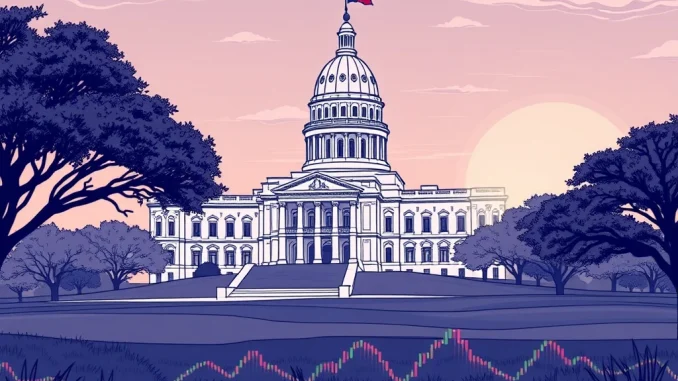
Big news from the Lone Star State! Texas is making moves in the digital asset space, particularly concerning Bitcoin. Governor Greg Abbott has officially signed legislation that impacts how potential state funds, including certain crypto assets, will be handled. This development marks a significant step in Texas’s approach to digital currencies and could set a precedent for other states. Let’s break down what this new Texas Bitcoin bill means.
What Does HB 4488 Texas Do?
Governor Greg Abbott recently enacted House Bill 4488. This isn’t just any piece of legislation; it’s specifically designed to safeguard designated state funds. The core purpose of HB 4488 is to prevent these specific funds from being automatically swept or transferred into the state’s general revenue pool. This protection extends to various types of assets that might be held within these designated funds.
Crucially, the language of HB 4488 includes provisions that could cover holdings like Texas state Bitcoin or other digital assets, provided they are established outside the traditional state treasury system. This doesn’t mean the state treasury is buying Bitcoin directly under this bill, but rather that any Bitcoin or digital assets held in certain state-managed funds (distinct from the main treasury) are now explicitly shielded from being repurposed into general revenue.
Is Texas Planning to Buy Bitcoin?
While HB 4488 protects potential digital asset holdings, a separate bill, Senate Bill 21, addresses the possibility of the state actually purchasing digital assets. As of now, Governor Abbott has not yet made a decision on SB 21. This bill proposes permitting the state to invest in digital assets, but with a specific condition: the asset must have a market capitalization of at least $500 billion.
Currently, looking at the cryptocurrency market, only one digital asset consistently meets this substantial $500 billion market cap threshold: Bitcoin (BTC). Therefore, if SB 21 were to pass, it would pave the way for Texas state funds to potentially acquire Bitcoin, marking a significant move towards institutional adoption at the state level. The decision by Greg Abbott Bitcoin policy could hinge on this bill.
The Broader Picture: Texas Crypto Law
Texas has been positioning itself as a friendly environment for cryptocurrency and blockchain technology. This latest legislative action, particularly the signing of HB 4488, reinforces that stance. By protecting potential digital asset holdings from being absorbed into general funds, the state signals a willingness to recognize and potentially hold such assets in the future.
The consideration of SB 21 further underscores this interest, exploring avenues for direct state investment within strict parameters. These legislative efforts contribute to the growing body of Texas crypto law, aiming to provide clarity and structure for digital assets within the state’s financial framework.
What’s Next for Texas and Digital Assets?
The signing of HB 4488 is a protective measure, securing the status of certain funds that might hold digital assets. The real potential for state investment lies with the outcome of SB 21. The crypto community and financial observers are keenly watching Governor Abbott’s decision on this bill.
Regardless of the SB 21 outcome, the passage of the Texas Bitcoin bill (HB 4488) demonstrates a forward-thinking approach to digital assets at the state level, acknowledging their increasing relevance and taking steps to protect them within specific financial contexts. This solidifies Texas’s reputation as a key player in the evolving landscape of cryptocurrency regulation and adoption in the United States.
In summary, Texas has enacted a bill to protect state funds, including potential Bitcoin holdings outside the treasury, while actively considering legislation that could allow direct state investment in high-market-cap digital assets like Bitcoin. These actions highlight Texas’s proactive stance in the digital asset space.



